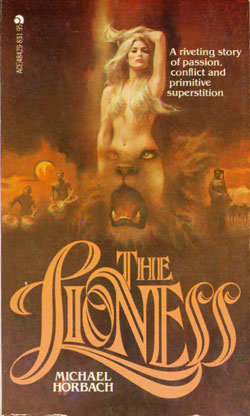 By MICHAEL HORBACH (Ace; 1974/79)
By MICHAEL HORBACH (Ace; 1974/79)
With this 1974 German novel, a bestseller in its native land, author Michael Horbach can be said to have provided a threefer: a historical drama, a bodice ripper and a supernatural thriller.
The setting is South Africa in 1879, the time of the Anglo-Zulu War. The large cast includes Virginia, a vivacious blonde teenager, Hendrik de Villiers, a wealthy French settler and Virginia’s guardian (who none-too-secretly lusts after her), and Ingwe, a Zulu prince who upon spotting Virginia becomes immediately infatuated, and determined to possess her. This he does, kidnapping and taking her to his homestead, which sets in motion a host of violent events unrelated to the Zulu skirmish.
Overhanging all this drama is the specter of a massive lioness. Possessed by an unquiet human spirit, this critter has everyone, white and dark skinned alike, terrified. Its presence is tied in with a curse trailing Virginia that results in her many suitors, which come to include a longtime tutor and a dashing prince, meeting unnatural deaths. Said lioness is eventually hunted down and killed, but not burned, which according to African folklore means the spirit that animated it is still extant. But of course the true curse afflicting Virginia and her fellows goes far deeper than the lioness, who, as explained by the following climactic passage, is but a symbol: “Doomed was the man who came to this continent only to exploit the land, to steal its treasures, to enslave its people.”
The author is said to have a “passionate interest” in Africa and its people, and provides an authoritative depiction of the land that feels historically accurate. He does this while adroitly juggling a plot-heavy cocktail of bloody action, soap opera histrionics, some PG rated sexual content and, of course, supernatural shenanigans, all contained in under 200 pages.
What’s missing is nuance. Michael Horbach was a reporter by trade, and his descriptions are quite straightforward, lacking in detail and atmosphere. The fault may be with the English translation by Ursule Molinaro and Hedwig Rappolt, which despite the rousing story fails to convey much in the way of excitement, and is the probable reason this book in English, in direct contrast to its original German language edition, sank into immediate (and permanent) obscurity.
